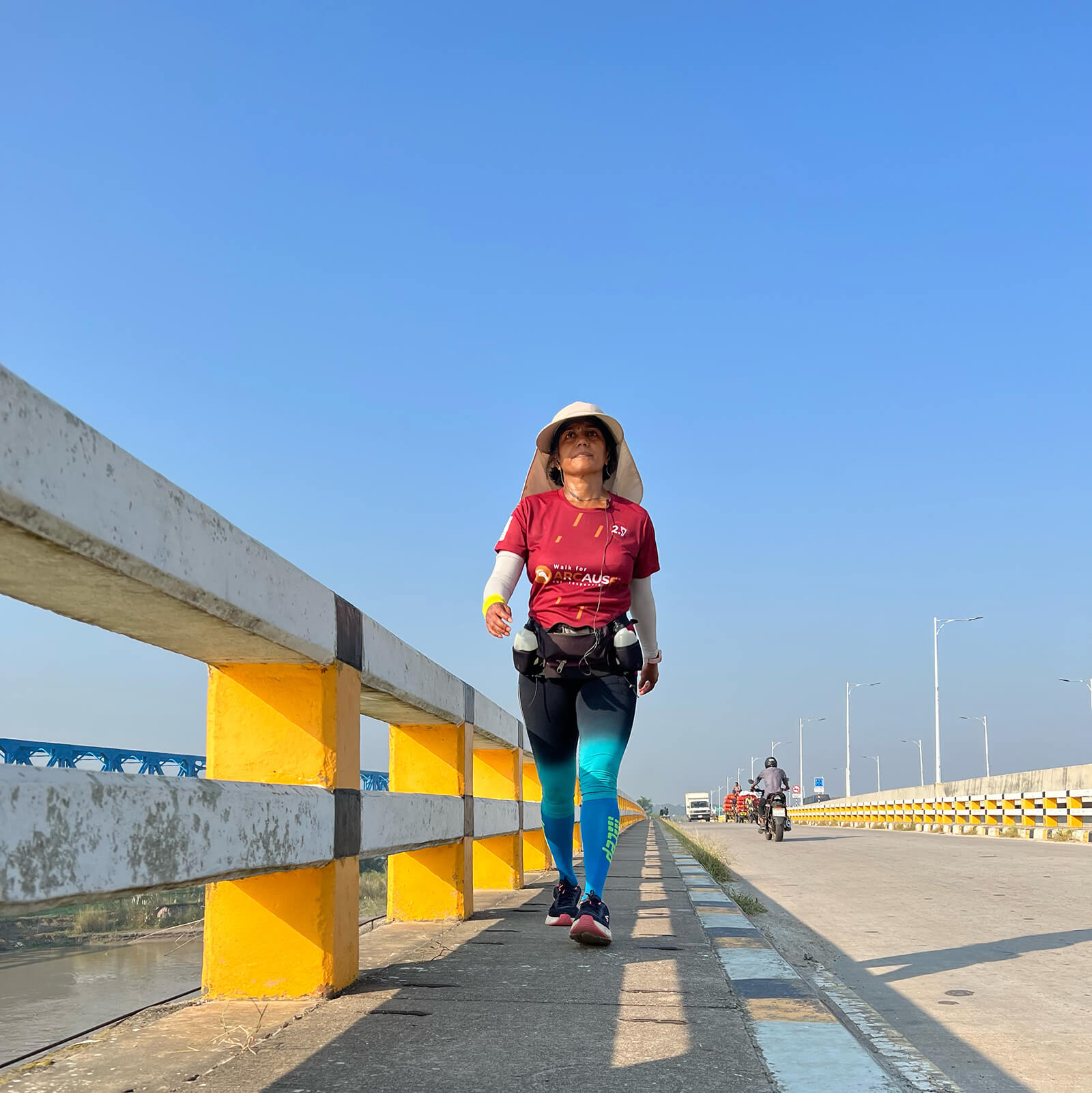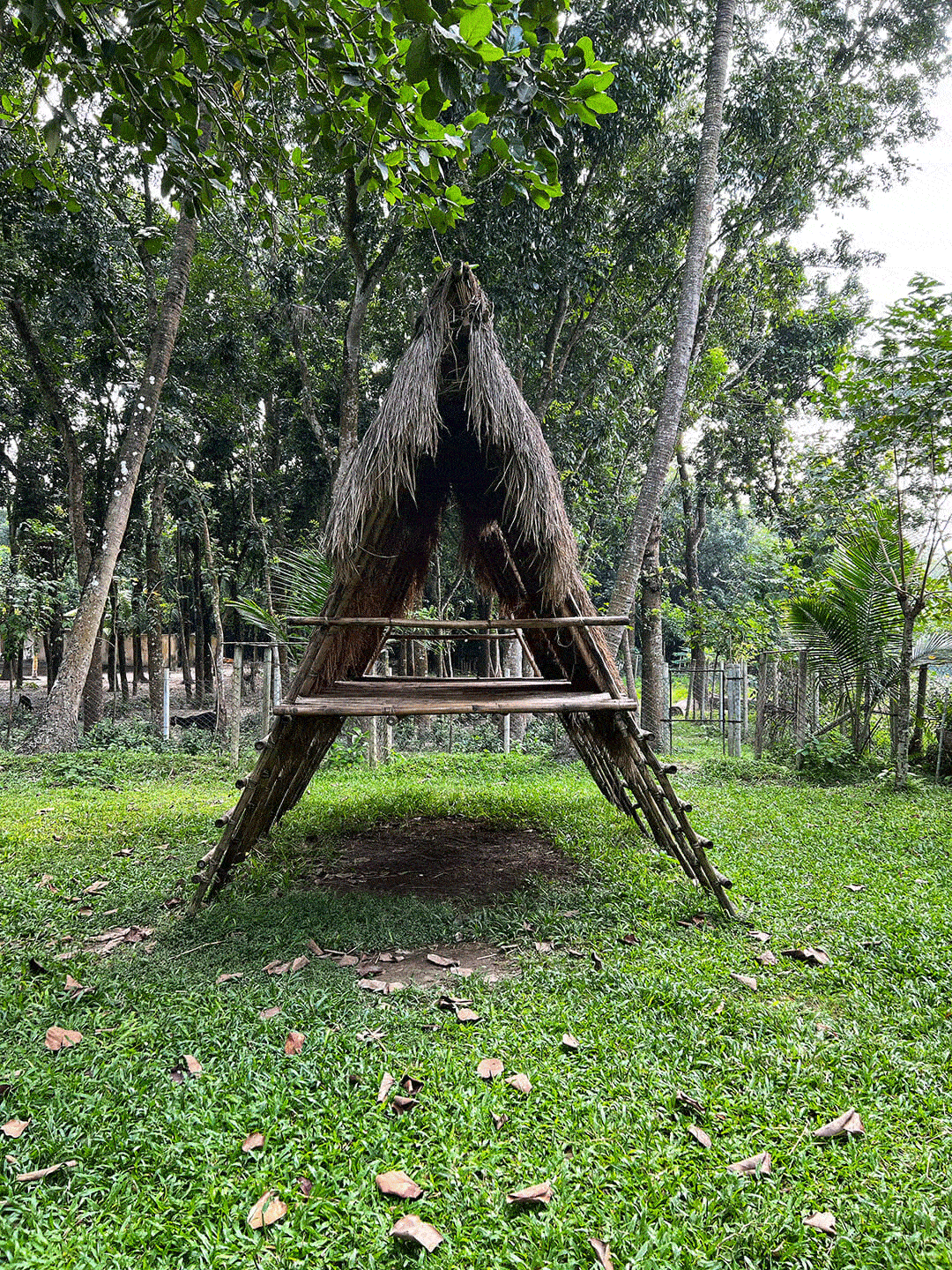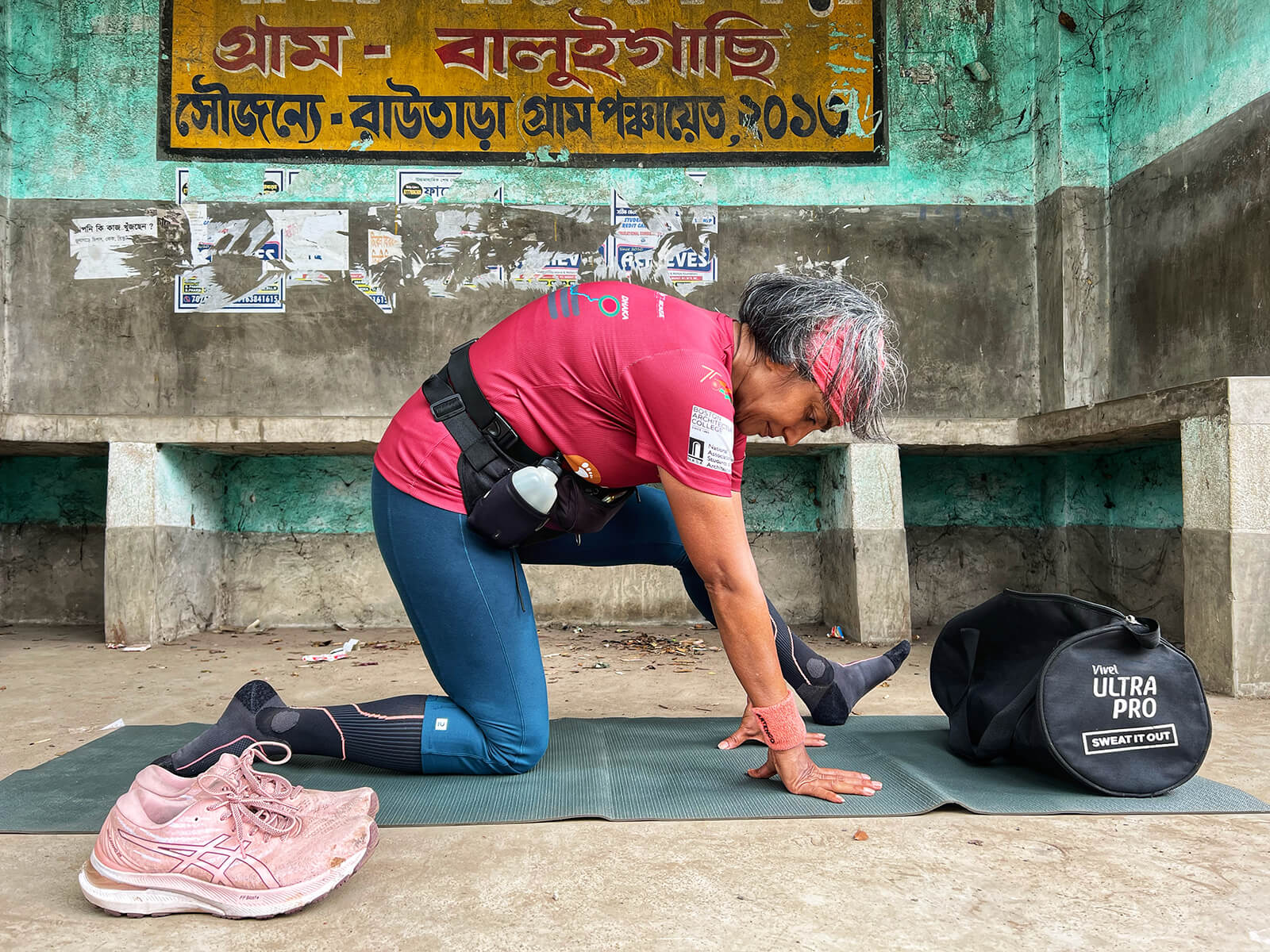Edgar Demello’s ‘Five Architecture Fables’ as a manifesto for oneness
by Bansari PaghdarMay 30, 2025
•make your fridays matter with a well-read weekend
by Zohra KhanPublished on : Feb 14, 2024
"Walk alone. Walk together. Walk for others. Walk for change. Walk to be changed.”
– Gita Balakrishnan, Founder, Walk for Arcause
Architect Gita Balakrishnan is on a mission. She has covered over 2500 kilometres so far on foot, treading one city after the other, in the hope of sensitising people about the power of good design. Through her initiative Walk for Arcause, she emphasises architecture’s social responsibility and the need for architects to break down the catacombs of architectural jargon and the imposingly high walls of their practices to connect with the community at large. Kolkata-based Balakrishnan is the founder and curator of Ethos, an organisation fostering extensive discourse to raise awareness around the built environment, and a network connecting architects, designers, engineers, and students. Brimming with a childlike zeal, undeterred by strenuous routes, and ever eager to strike up a conversation with anyone she meets, Balakrishnan is quite a (gentle) force in herself. For someone who believes that construction workers should be included in design conversations, that history should be considered from the prism of living monuments, and design must move away from being a luxury to a right, these walks, she says, are only a means to a bigger cause.
STIR connected with her to discover more of her on-road adventures. The following are edited excerpts from an interview with her.
Zohra Khan: Walking thousands of kilometres to raise awareness on design is quite a feat. What keeps you stimulated?
Gita Balakrishnan: The never-ending road ahead. The myriad possibilities. The immense goodwill around us.
Zohra: What inspired you to come up with Walk for Arcause?
Gita: In the last two decades of my working with our community of architecture, construction, engineering, and design through Ethos, I realised that we are rather inward-looking and other than our clients, we don’t make efforts to showcase the difference that good design can make in improving lives. I know there are some who make that effort, but as a practice, we do not go out there, interact and work with communities. Arcause as an initiative was conceptualised for acknowledging, enlisting, and actualising the social responsibilities of our community. I think by being visible more in society we will be serving our own interests. Hence, Arcause is really ‘Architects for a Cause’ and for the ‘Cause of Architects’.
Zohra: When and how did it begin?
Gita: While all our work through Ethos has been about filling gaps that we identify in our field—such as lack of awareness and learning, loss of interest in books, placements and recruitments, taking the experience of practice to classrooms, the actual launch of Ethos Foundation was in November 2021 and the foray into harnessing the collective of our community for larger social action commenced with the first Walk for Arcause. The campaign Walk for Arcause is only a means, a tool for bringing the spotlight on our profession and also a spark to kindle the need for social responsibility while also creating avenues for action.
The walk is a means. The cause is paramount.

Zohra: How far along has the initiative progressed?
Gita: I think it has been a good two years and a lot has happened.
2500 km of walking—Kolkata to Delhi; Kolkata to Dhaka; Konark to Bhubaneswar via Puri and the more recent being Chennai to Bengaluru.
Walk for Arcause 1.0 - This exploratory 1700 km walk from Kolkata to Delhi took me through six states (West Bengal, Jharkhand, Uttar Pradesh, Madhya Pradesh, Rajasthan, and Haryana) and the National Capital Territory of Delhi. The stated objective of this walk was to explore how design could change lives and bring the focus on architecture’s social responsibility.
Walk for Arcause 2.0 - This was a 306 km journey that took me across the borders to Dhaka in Bangladesh. The theme for this expedition was ‘Uniting through Design’. The region of our subcontinent has some fine examples that could serve as an inspiration but unfortunately, we are often taking inspiration from the West that has no similarity in context to ours. All we have to do is to come together and draw from our common history, context, culture and social conditions.
Walk for Arcause 3.0 - This was a 98.8 km walking studio that was intense with four colleges in Odisha participating in it. While I walked, we converged to study communities and the students explored them in groups. Stimulating discussions on their evolution and the way forward followed. The faculty from the colleges of Piloo Mody College of Architecture, KIIT School of Architecture and Planning, VSSUT Burla, and CET Bhubaneswar were actively involved in mentoring the students too. It was a studio that would go a long way in shaping the persona of the students. A fishing village in Konark, a religious muttin Puri, and the crafts communities of Raghurajpur and Balakati were studied as a part of this initiative.
Walk for Arcause 4.0 - This ended recently and is very fresh in my memory. Spearheaded as a partnership between Mphasis Foundation and AVAS with Ethos Foundation as a knowledge partner, universal design and accessibility were the central foci of this walk. We learnt, advocated and internalised what it meant to include everyone with no barriers of age, gender, ability, or background when we design and build spaces. The design needs to be for all right from the start of the process.
It is fascinating to see how a city becomes another, a state becomes another, and even a country becomes another, at the pace of walking.
Zohra: How do these walks unfold and what happens in them?
Gita: As I said, the walk is only a means. The cause is paramount. From that perspective, each walk has been different and has had its magic.
There is a lot of work that goes into creating tools to gather information that would help us determine the future course of action. These walks are never seen in isolation. I have been carrying a kit for each walk which includes presentations for different audiences, flashcards, narratives, and stories. We also work hard on understanding the kind of documentation that would be required based on which the team is built and briefed. Using social media effectively is central to these initiatives since building awareness is at its core. Engaging with people along the way is crucial and hence ways of connecting and prompting conversations are also curated. These are largely for wayside spontaneous interactions—at tea stalls, bus stops, and similar pit stops.
Zohra: It’d be interesting to learn of a heartening experience or a story from your journey thus far. Can you share something with us?
Gita: Every day threw up beautiful stories. The best reactions were from children, who would begin with giggles and slowly warm up enough to ask questions. When quizzed about their career ambitions, the answers often showed that they wanted to be teachers, nurses or join the police force or armed forces. Very few even knew of the existence of an architect.
In a lighter vein, I remember the challenge of not finding a toilet along the way and Rajua - who allowed me to use her toilet in the village of Umari, later asked me to pay her back with some design advice. I did spend some time looking at her house which was under construction. The contractor who was designing and building her home was on a break in the village from his job as a construction worker in the city. This was again a pattern that played out which needs some attention. These workers learn from our sites in the city and return to their villages to become the designers who reproduce with scant attention to scale and proportion.
Zohra: When you tread one city after the other, how do changing landscapes affect your perspective towards your practice as an architect?
Gita: It is fascinating to see how a city becomes another, a state becomes another, and even a country becomes another, at the pace of walking. I observed keenly, marvelling at how a religious city like Mathura slowly transforms into the industrial Palwal.
Identifying issues that need attention is also essential to our practice since we are in the space of building a collective towards social action. The action areas that we identified and have been building on are -
ShramA - Shramik Action: The need to include construction workers in conversations, dissolving the many layers that exist between them and the architect.
UDita - Universal Design is the answer: This is a crying need and has been our biggest project in the last year. We have built a course that could help students and architects alike in equipping themselves with ways of including Universal Design Principles in their design processes.
BODH - Building On Design Histories: It is important to view history from the prism of living monuments that speak of common people instead of the ones that typically get attention.
ADAR - Affordable Design A Right - Making Design Accessible to All: Design should move from being a luxury to a right.
Environment and Infrastructure
Design Literacy

Zohra: Can you tell us about the recently concluded edition of Walk for Arcause? How has it been different from the previous editions?
Gita: This walk was aimed at raising awareness about creating inclusive environments for individuals of all ages, abilities and backgrounds. With this agenda, we had put extra efforts into curating on-route interactions to recognise and understand the diverse needs of individuals living with disabilities, educating the general public on the matter, and gaining insights from organisations actively contributing to building a more inclusive society. Needless to say, the essence of the journey lies in spontaneous interactions which exposed the project to varied perspectives, good and bad examples, thereby enriching the initiative.

Zohra: What is a change that you seek to bring through these walks?
Gita: The desirable outcome for me would mean the right message reaching the right people who could make the right difference. Raising awareness to cultivate empathy and inspiring people to take action is the change I am looking to bring about.
Zohra: What is NEXT for you?
Gita: The initiative certainly doesn’t conclude with the walk but will only be a beginning, to touch lives through design from the actions of many. 2024 has already been very busy and we are excited to see what lies ahead. While through my walk and project UDita, we are working towards building an inclusive society and built environment, there are other projects in the pipeline too. This is just the start.
by Bansari Paghdar Oct 16, 2025
For its sophomore year, the awards announced winners across 28 categories that forward a contextually and culturally diverse architectural ecosystem.
by Mrinmayee Bhoot Oct 14, 2025
The inaugural edition of the festival in Denmark, curated by Josephine Michau, CEO, CAFx, seeks to explore how the discipline can move away from incessantly extractivist practices.
by Mrinmayee Bhoot Oct 10, 2025
Earmarking the Biennale's culmination, STIR speaks to the team behind this year’s British Pavilion, notably a collaboration with Kenya, seeking to probe contentious colonial legacies.
by Sunena V Maju Oct 09, 2025
Under the artistic direction of Florencia Rodriguez, the sixth edition of the biennial reexamines the role of architecture in turbulent times, as both medium and metaphor.
 surprise me!
surprise me!
make your fridays matter
SUBSCRIBEEnter your details to sign in
Don’t have an account?
Sign upOr you can sign in with
a single account for all
STIR platforms
All your bookmarks will be available across all your devices.
Stay STIRred
Already have an account?
Sign inOr you can sign up with
Tap on things that interests you.
Select the Conversation Category you would like to watch
Please enter your details and click submit.
Enter the 6-digit code sent at
Verification link sent to check your inbox or spam folder to complete sign up process



by Zohra Khan | Published on : Feb 14, 2024
What do you think?